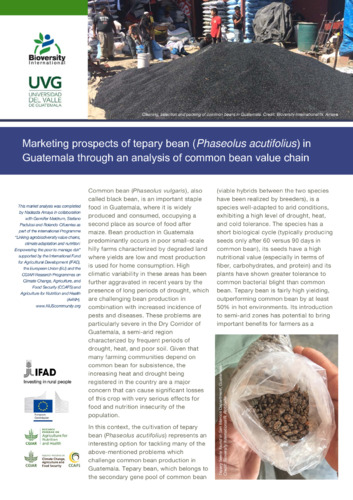Marketing prospects of tepary bean (Phaseolus acutifolius) in Guatemala through an analysis of common bean value chain
Tepary bean (Phaseolus acutifolius) is an interesting option for adapting bean production to climate change in Guatemala. Tepary bean is a well-adapted to arid conditions, exhibiting a high level of drought, heat, and cold tolerance and it is known to outperform common bean in hot environments. Tepary bean originated in Mesoamerica and the south-western USA has been cultivated historically in Guatemala, although today it is only very rarely produced in this country and the crop has nearly been forgotten. Owing to tepary bean’s strategic features, Bioversity International and the Universidad del Valle de Guatemala (UVG) have been investigating the potential for tepary bean to diversify bean production for better resilience under climate change. As the market potential and willingness of farmers to adopt a new bean species are critical factors that would affect the success of this strategy, an investigation was carried out in 2017 to assess bean value chain stakeholder perspectives and potentials for adopting and commercializing this species. The study deployed a Rapid Market Appraisal methodology to collect qualitative data through semi-structured interviews of different stakeholders engaged in the value chain of common bean, including producers, producers’ organizations, wholesalers, processing industry, consumers, indirect actors and other informed participants. This brief shares key results from this research.

